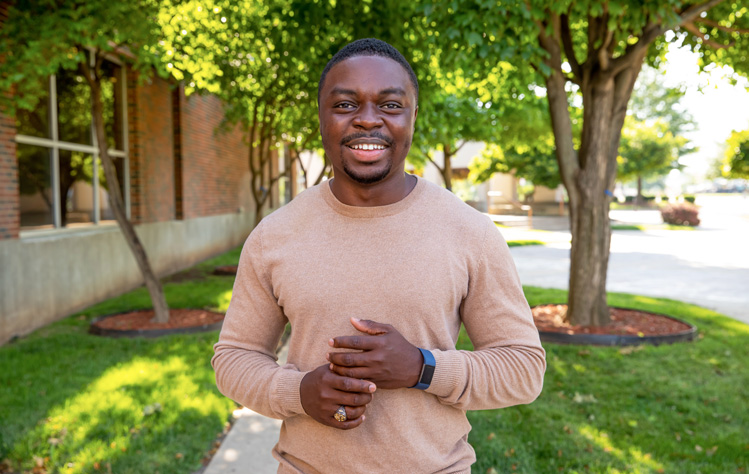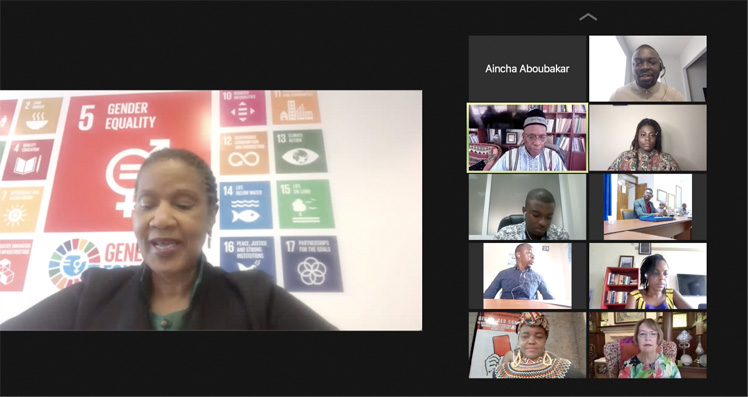International Relations Student Serves on ARDN's Pan-African Youth Leadership Summit
August 16, 2021

Webster University student Igho Ekakitie was selected as a panel participant for the sixth Pan-African Youth Leadership Summit, “Climate Action Now! Women, Youth, and Climate Change,” held virtually this summer. The summit was organized by ARDN in partnership with UNDP, the Republic of Costa Rica, UNFPA, UN Women, and UN-Habitat, with the support of the Federal Democratic Republic of Ethiopia. Youth from the African continent and the diaspora, and other stakeholders gathered to address issues around the climate crisis, including the concerns and achievements of young people and the vision and voices of women and others who have been traditionally underrepresented.
“Standing up for human rights, especially in Africa and all over the world, is the major reason I came to Webster University,” said Ekakitie. “It is one of the leading universities with regards to international relations and having a global perspective of issues around the world and how to solve them. A Webster degree will launch me on the path to fulfilling my dream of working for the United Nations in fighting for human rights.”
Ekakitie, an international student from Nigeria, is enrolled in the International Relations BA and MA combined degree program at the University’s main campus in St. Louis. He is the recipient of multiple scholarships including the McKillin Family Endowed Scholarship Fund and the Elizabeth J. Stroble Global Endowed Scholarship Fund. Chancellor Stroble and Chief Diversity Officer Vincent C. Flewellen nominated Ekakitie to the ARDN youth summit due to his international relations studies, his lived experience growing up in Nigeria, his work as a member of the United Nations Association of the United States of America (UNA-USA) St. Louis Chapter, and his career goal of working for the United Nations.
We have a lot of work to do, as humans. We must begin now to call our leaders and teach our younger generation of people the power of advocacy.
At the request of the summit organizers, Ekakitie stepped in to fill the role of rapporteur (similar to a moderator) for the second group’s breakout session, “Gender Equity and Inclusion: Systemic barriers and challenges faced by women of Africa and the Diaspora, and strategies and commitments to breakthrough.”
Ekakitie joined student panelists from other African countries including Senegal, Mali, Kenya, Ethiopia, Uganda, and South Africa in identifying several youth-led solutions to addressing the climate crisis, gender inequality and the challenges climate change has brought about in their own communities, impacting food, shelter and employment.

“I've always had an interest in human rights to help people,” said Ekakitie. “But I did not know the extent to which other African countries experience issues of gender equality, regional climate change, and how it affects their day-to-day life. So, hearing those stories and hearing the experiences from other Africans meant a lot to me.”
Addressing the Climate Crisis
The Senegalese panelist shared that some people in the rural areas in his country no longer have a place to work because of erosion that has washed away farmlands and affected the housing sector, which are obvious signs of the effects of climate change. Food insecurity is an urgent issue, said the Kenyan panelist, with food prices skyrocketing because of climate change that has affected food production and accessibility. The climate change issue overall is further compounded by a lack of understanding of what climate change truly is, said the South African panelist.
The group then explored ideas for strategies and commitments which young people can be a part of. One panelist shared that the Ethiopian government has supported campaigns like planting five million trees yearly, and that the government has embraced technology in tackling climate change effects.
Standing up for human rights, especially in Africa and all over the world, is the major reason I came to Webster University.
“We have a lot of work to do, as humans,” said Ekakitie. “We must begin now to call our leaders and teach our younger generation of people the power of advocacy and the importance of doing the right thing, in terms of seeing everyone as equal, bridging those gaps that hold us back. So, for me, it was a revelation to see that the issues we face are not local to our counties but a collective experience among African countries, and we need to work together to find the solutions.”
How Climate Change Impacts Women
Also discussed at the summit were the systemic barriers and challenges faced by women of Africa and the Diaspora in connection with climate change. This link is explored in the Global Citizen article “Understanding Why Climate Change Impacts Women More Than Men,” which explains how the effects of climate change are being shaped by “pervasive and entrenched gender inequality.”
Gender inequality hampers women’s capacity and potential to be actors of climate action.
“The IPCC [International Panel on Climate Change] found that gender inequalities are further exaggerated by climate-related hazards, and they result in higher workloads for women, occupational hazards indoors and outdoors, psychological and emotional stress, and higher mortality compared to men,” reported Verona Collantes, an intergovernmental specialist with UN Women.
“Gender inequality hampers women’s capacity and potential to be actors of climate action. These gender inequalities — access to and control over resources, access to education and information, and equal rights and access to decision-making processes — define what women and men can do and cannot do in a particular context of climate change,” added Collantes.
During the Pan-African Youth Leadership Summit, the Ugandan panelist spoke about these issues, noting how sexual reproductive health and rights have been affected, while the Ethiopian panelist said that illiteracy and lack of enlightenment is a major challenge faced by women. Political and structural adaptations were also revealed as challenges.
Making and Measuring Progress
“We're continuing and looking to have another summit,” said Ekakitie. “We now have a responsibility to reach out to people about these issues and enlighten them. We must increase our advocacy work by calling our elected leaders, sending them emails, and encouraging them to use their political will to work on these solutions So, we look forward to meeting again so we all can see progress of what was done so far in the recommendations we made. We hope that by the end of the year, we've made much progress.”
In addition to his work with the Pan-African Youth Leadership Summit and the UNA-USA, Ekakitie also produces and hosts the podcast igowithigho.com, which features discussions with international students from around the world and individuals who are change-makers in society. “The podcast for international students is a safe place to share our experiences so that people can know what we go through here as international students, and the hurdles we have to jump to be the best of us,” said Ekakitie.
